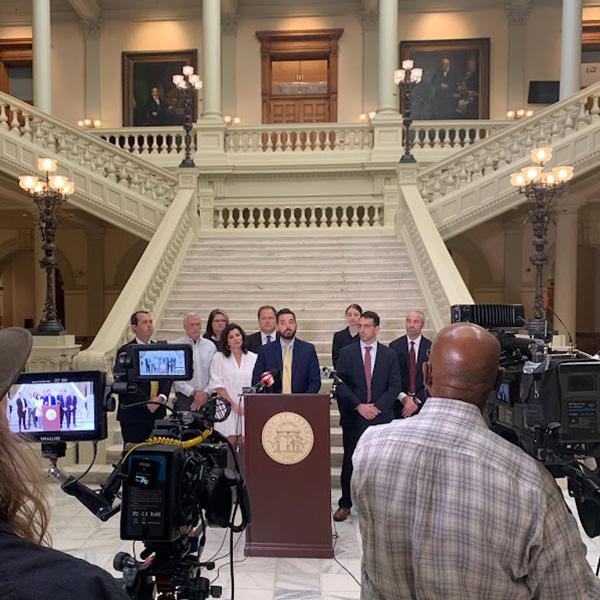Atlanta Wrongful Death Lawyer
Get Justice for Your Loss and Strength for the Journey Ahead
When a loved one’s death is caused by negligence or misconduct of another party in Georgia, an Atlanta wrongful death attorney can help families pursue justice and compensation for funeral costs, lost income, and emotional distress. We’re a dedicated Georgia Wrongful Death Law Firm with experience in cases involving car accidents, medical errors, defective products, and kratom. In Georgia, only family members like the spouse, children, parents or estate representative can file a wrongful death claim and pursue wrongful death compensation for the full value of life of the deceased.
Choosing the right Atlanta wrongful death lawyer is crucial for each case. Georgia’s two-year statute of limitations for wrongful death claims makes time a critical factor. Look for a wrongful death attorney with a strong track record in Georgia courts like Fulton or Chatham County, peer recognition, and a fair contingency fee structure. Top Atlanta wrongful death lawyers use expert witnesses and resources to hold all responsible parties like drivers, corporations, or care facilities accountable.
Our firm focuses only on wrongful death claims throughout Georgia. We’re grounded in wrongful death lawsuits and have all the resources needed to win your claim with insurance companies or represent you in court. Let our experienced Atlanta wrongful death attorneys handle your claim while you focus on healing. From nursing home wrongful deaths, medical malpractice to fatal car accidents in Atlanta, we offer compassionate, comprehensive support, starting with a free consultation.
Get Free Case Evaluation
Get in touch with an experienced Atlanta Wrongful death attorney and schedule a free case evaluation by completing the quick form below.

What is a Wrongful Lawyer?
A wrongful death lawyer is a legal professional who specializes in representing families and loved ones of individuals who have died due to another person’s negligence, recklessness, or intentional misconduct. They help clients pursue legal action to seek compensation for funeral expenses, lost wages, emotional distress, and other damages.

If you’ve lost a loved one due to negligence or another person’s willful action, act quickly to preserve your claim. Speak with our experienced wrongful death attorneys for free wrongful death consultation.
Meet Eli Cohen: Founding Partner & Lead Wrongful Death Attorney
Investigative Authority in Georgia Wrongful Death Litigation: Led by Eli Cohen, a veteran trial attorney with twelve years of experience as a Georgia police officer and SWAT investigator, our firm provides a forensic advantage rarely found in civil law. We don’t just review accident reports; we deconstruct them using the same investigative rigor Eli applied to fatal traffic homicides and major crime scenes. This “boots-on-the-ground” perspective allows us to uncover hidden evidence and challenge official narratives, building an unshakeable foundation for your family’s claim.
A Strategic Advantage for Grieving Families. At Georgia Wrongful Death Attorney P.C., we combine real-world field experience with sophisticated legal advocacy to hold negligent corporations and insurance companies accountable. We understand that justice for a loved one requires more than just legal knowledge; it requires a relentless search for the truth. When your case demands an investigator’s eye and a trial lawyer’s discipline, our firm is dedicated to securing the answers and the maximum compensation your family deserves.

Types of Wrongful Death Cases We Handle in Atlanta, GA
Truck Accident Wrongful Death
Car Accident Wrongful Death
Medical Malpractice Wrongful Death
Construction Accident Fatalities
Premises Liability Wrongful Deaths
Product Liability Wrongful Deaths
Why Choose Us for your Wrongful Death Cases in Atlanta, Georgia?
100% Case Success Rate
Expert Legal Services
Compassionate Advocacy
No Fees Unless We Win
Resources & Dedication
Personalized Attention
24/7 Availability
Multi-Disciplinary Approach
Respected Litigation Reputation
We Fight for Your Right. No Win, No Fee.
What Compensation is Available for Wrongful Death Claims in Atlanta, Georgia?
Losing a loved one is one of the hardest things anyone can face especially when their death could have been prevented. In Georgia, families have the right to file a wrongful death claim to recover both financial and emotional losses. It’s not just about money; it’s about getting support, finding justice, and helping you move forward. This is why we echo: Justice for Your Loss. Strength for Your Journey. Here’s the compensation you may be entitled to:- Full Value of Life
This covers both the financial and personal value of your loved one’s life, including:
- Lost income and benefits they would have earned
- The work, services, and care they would have provided
- Everyday joys, experiences, and time with family that were lost
- Expenses Related to the Death
You can also recover costs directly tied to their passing, such as:
- Medical bills for treatment before death
- Funeral and burial expenses
- Pain and suffering your loved one experienced before they died
- Punitive Damages If the death was caused by especially reckless or intentional actions, you may also be awarded punitive damages. These are meant to punish wrongdoers and discourage similar behavior in the future.
Qualities to Look for in an Atlanta Wrongful Death Lawyer
Choosing the right Atlanta wrongful death attorney after losing a loved one can feel overwhelming. You’re navigating grief while facing a complicated legal process, and the lawyer you select can make all the difference. A skilled wrongful death attorney will not only fight for your family’s justice but will also guide you through every step with compassion and strength. Here are the essential qualities to look for when hiring a wrongful death lawyer in Georgia:
1. Specific Experience With Wrongful Death Cases
Wrongful death claims are complex and require a deep understanding of Georgia’s specific laws, such as the Wrongful Death Act (O.C.G.A. §§ 51-4-1 through 51-4-6). These statutes govern who can bring a claim, the types of damages available, and how compensation is distributed. Make sure you choose an attorney who has a proven record of handling wrongful death cases, not just general personal injury cases and achieving favorable outcomes for families.
2. Compassion and Empathy
This case is personal. You deserve a lawyer who truly understands the emotional weight you’re carrying and treats you with compassion and respect. The right attorney will listen to your story, answer your questions patiently, and provide emotional support alongside legal counsel.
3. Strong Negotiation Skills
Most wrongful death claims are resolved through settlement negotiations rather than trial. A top Georgia wrongful death lawyer will be a fierce negotiator who can stand up to insurance companies and defense attorneys to secure maximum compensation for your family.
4. Trial and Litigation Experience
While settlements are common, some cases demand a courtroom battle to achieve justice. Choose a lawyer with extensive trial experience—someone who knows how to prepare for trial under Georgia’s civil procedure rules and can confidently argue your case before a jury if necessary.
5. Clear, Honest Communication
The legal system is complicated enough without confusing jargon. Your attorney should explain the legal process clearly, keep you updated on your case’s status, and always be available to answer your questions. You should feel informed, empowered, and never left wondering about the next steps.
6. Deep Local Knowledge
Wrongful death claims must follow specific Georgia procedures, including statutes like the two-year statute of limitations (O.C.G.A. § 9-3-33). A Georgia-based lawyer familiar with local courts, judges, and jury expectations will have critical insights that an out-of-state attorney may lack.
7. Reputation for Excellence
Research your potential lawyer’s reputation. Look for client testimonials, online reviews, professional ratings (such as Avvo, Martindale-Hubbell, or Super Lawyers), and past case results. A strong reputation for professionalism, compassion, and success is a good sign you’re making the right choice.
8. Resources and Connections
Wrongful death cases often involve complex investigations, expert witnesses, accident reconstruction, and financial analysis. Ensure your attorney has the resources, networks, and team necessary to build the strongest possible case.
9. Contingency Fee Arrangement
Most reputable wrongful death attorneys in Georgia work on a contingency fee basis you don’t pay unless they win your case. This structure shows they are confident in their ability to help you and spares your family the burden of upfront legal fees.
What to Do if You Suspect Wrongful Death in Georgia
If you believe your loved one’s death was the result of negligence, abuse, or other preventable causes, it’s essential to take immediate action. The legal process can be complex, and every step you take can help strengthen your case. Here’s a guide on what to do if you suspect wrongful death in Georgia:
1. Request an Independent Autopsy
- Why it’s important: An autopsy can help determine the exact cause of death and may provide crucial evidence of negligence, abuse, or mistreatment.
- Action: Even if the nursing home or medical provider does not agree, request an independent autopsy through your attorney. This can provide an unbiased medical opinion on the cause of death and help establish a legal link to negligence.
2. Gather All Relevant Documents and Evidence
- Medical Records: Request a complete copy of your loved one’s medical history, including charts, prescription logs, and nursing notes. This will help identify any lapses in care or evidence of neglect.
- Incident Reports: If your loved one was involved in an accident or incident at the nursing home, obtain the facility’s internal incident reports, which could contain critical information about what happened.
- Photographs or Video Evidence: If possible, take photos of any injuries, wounds, or conditions that seem to indicate neglect or abuse. Video surveillance footage from the nursing home can also be invaluable, especially if it shows staff misconduct.
3. Report the Death to Authorities
- File a Complaint with the Georgia Department of Community Health (DCH): In Georgia, the DCH regulates nursing homes and investigates complaints related to patient care. You can file a formal complaint with the DCH’s Healthcare Facility Regulation Division.
- Notify Local Law Enforcement: If you suspect that the death involved physical abuse, assault, or criminal conduct, report it to your local police department. Criminal investigations may be required before a civil lawsuit can proceed.
4. Avoid Speaking to the Nursing Home’s Insurance Company
- Insurance representatives may try to settle quickly or even deny responsibility, offering a low settlement amount in exchange for your agreement not to pursue legal action.
- How to handle this: Do not give statements or sign anything without consulting an attorney first. Insurance adjusters are trained to reduce payouts, and anything you say could be used to undermine your case.
5. Consult an Experienced Wrongful Death Attorney
- Why an attorney is crucial: A skilled wrongful death lawyer will understand the specific laws and regulations governing nursing home negligence in Georgia and can help guide you through the legal process.
- What they’ll do: Your attorney will conduct a thorough investigation, collect evidence, consult with medical and legal experts, and represent you throughout the litigation process. They will also ensure that your family’s claim is filed within Georgia’s two-year statute of limitations for wrongful death cases (under O.C.G.A. § 9-3-33).
6. Document Your Emotional and Financial Losses
- Why it matters: In a wrongful death case, you can recover both economic and non-economic damages. Emotional distress, loss of companionship, and mental anguish are key elements of your claim.
- How to document it: Keep a journal of your emotional struggles, family hardships, and financial losses (including funeral expenses, lost wages, and medical bills). These can help substantiate your claim for compensation.
Meet Our Experienced Wrongful Death Lawyers in Atlanta
Whether negotiating settlements or representing clients in court, we bring decades of experience and professionalism.
How to Hire the Best Wrongful Death Lawyer in Atlanta
Choosing the best Atlanta Wrongful Death Lawyer is crucial to ensuring you receive the justice and compensation your family deserves. The lawyer you select will guide you through the complex legal process and help you determine whether to settle or go to trial based on your unique circumstances.
Key Factors to Consider When Choosing an Infant Wrongful Death Lawyer:
- Experience with Wrongful Death Cases: Ensure the lawyer specializes in wrongful death cases, particularly those involving infants, as they require a unique approach and deep understanding of medical and product liability issues.
- Track Record of Success: Look for a lawyer with a proven history of securing favorable verdicts and settlements in similar cases. Their success rate is a strong indicator of their ability to handle complex claims effectively.
- Compassion and Sensitivity: Infant wrongful death cases are emotionally charged. Your lawyer should demonstrate empathy, offering you the emotional support and understanding you need during this difficult time.
- Willingness to Go to Trial if Necessary: While many cases settle, some need to be fought in court. A strong lawyer will not back down if it’s in your best interest, especially if the defendant is offering an unfair settlement.
- Clear Communication and Transparency: Your lawyer should keep you informed at every stage, explaining the legal process in a way that’s easy to understand. They should also provide honest assessments of the case, including the potential outcomes.
By choosing the right wrongful death lawyer, you ensure that your family’s case is handled with the respect, expertise, and dedication it deserves, giving you the best chance at securing justice and closure.
Speak to an Atlanta Wrongful Death Lawyer
Get in touch with an experienced Atlanta Wrongful death lawyer and schedule a free case evaluation by completing the quick form below.
What Clients Say About Our Firm
Rebecca Harris
- Wrongful Death
Scott Smithwick
- Personal Injury
Debendra Deba
- Wrngful Death
Lauren Sulkis
- Wrongful Death
Kaiser Reed
- Wrongful Death
Denver Camden
- Wrongful Death
Frequently Asked Questions
What is considered wrongful death under Georgia law?
Georgia law, under O.C.G.A. § 51-4-1, defines wrongful death as any death resulting from a crime, criminal or other negligence, a defective product, or a breach of warranty or contract. Specifically, the statute states:
“Homicide” includes all cases in which the death of a human being results from a crime, or from criminal or other negligence, or from property or product defects, or from breach of warranty or contract.”
In simple terms, a wrongful death occurs when someone's life is wrongfully taken due to another party’s failure to exercise reasonable care, intentional misconduct, or violation of legal obligations. This can arise from situations like car accidents, medical malpractice, unsafe products, workplace accidents, or even criminal acts like assault.
Georgia’s wrongful death laws are designed to ensure that families have a legal avenue to seek justice, closure, and financial security after losing a loved one due to someone else’s wrongdoing.
What is a wrongful death claim in Georgia?
A wrongful death claim in Georgia is a civil lawsuit filed when someone’s death results from another party’s negligence, recklessness, or intentional act. Such claims can arise from incidents like car accidents, medical errors, dangerous property conditions, or defective products, where the responsible party failed to exercise reasonable care, leading to a fatal outcome.
According to Georgia Code § 51-4-1, these claims allow eligible family members to seek compensation for financial losses, such as funeral expenses and lost income, as well as non-financial losses, like the emotional impact of losing a loved one. The purpose is to provide financial relief and hold negligent parties accountable for preventable deaths.
The process involves proving that the defendant owed a duty of care, breached it through negligent actions, and directly caused the death, resulting in measurable damages.
For example, a property owner ignoring a broken railing that causes a fatal fall could be liable. These cases require gathering evidence, such as incident reports or witness statements, and often involve complex legal arguments to establish fault. Families pursuing such claims typically face challenges like strict deadlines and insurer defenses, making a clear understanding of the law essential. Wrongful death claims aim to address both the tangible and intangible impacts of loss, though no amount can fully compensate for the absence of a loved one.
Key elements of a wrongful death lawsuit
For a wrongful death claim to succeed, four essential elements usually must be proven:
- Duty of Care
- The defendant (the at-fault party) owed a legal duty of care to the deceased.
- Example: A driver must operate a vehicle safely and obey traffic laws.
- Breach of Duty
- The defendant breached that duty by acting negligently, recklessly, or intentionally.
- Example: A driver was texting while driving and ran a red light.
- Causation
- The breach of duty directly caused the death.
- Example: The driver’s reckless action led to a fatal collision.
- Damages
- The death caused measurable losses to the surviving family members (financial losses, emotional pain, loss of companionship, etc.).
Who is eligible to file a wrongful death claim in Georgia?
In Georgia, a specific hierarchy determines who can file a wrongful death claim, prioritizing those closest to the deceased. The surviving spouse has the primary right to file, representing themselves and any minor children. If no spouse exists, the deceased’s children biological or legally adopted can file. In the absence of a spouse or children, the parents are eligible, and if no immediate family survives, the estate’s administrator may file on behalf of the next of kin, as outlined in Georgia Code § 51-4-2 and § 51-4-5. This structure ensures that those most affected by the loss have the opportunity to seek legal redress.
Eligibility can become complicated in situations involving blended families, estranged relatives, or disputes among heirs. For instance, if multiple children file, they must coordinate, and parental rights may require clarification in cases of divorce. When an estate administrator files, the process intersects with probate law, requiring identification of the next of kin. Understanding these rules is critical, as only authorized individuals can pursue damages for losses like financial support or emotional companionship. The law aims to balance fairness with clarity, but navigating these nuances often demands careful attention to family dynamics and legal requirements to avoid procedural errors.
What types of incidents can lead to a wrongful death claim in Georgia?
Wrongful death claims in Georgia can stem from numerous incidents where negligence causes a fatality. Common examples include motor vehicle accidents, such as collisions due to distracted driving; medical malpractice, like misdiagnoses leading to untreated conditions; dangerous property conditions, such as unfixed hazards causing falls; defective products, like faulty machinery; and workplace accidents, such as construction site failures.
Other scenarios might involve inadequate security enabling criminal acts or pedestrian accidents due to reckless driving. Each case depends on demonstrating that the responsible party’s failure to act reasonably resulted in the death.
The diversity of these incidents means evidence varies widely crash reports for car accidents, medical records for malpractice, or maintenance logs for property cases. Proving negligence requires showing a breach of duty, such as a driver ignoring traffic laws or a landlord neglecting repairs, directly caused the fatal outcome.
These cases often involve multiple parties, like manufacturers, employers, or government entities, complicating liability. Families must also quantify damages, from funeral costs to the loss of emotional support, which adds layers of complexity. Understanding the specific incident type is key to identifying viable claims and the evidence needed to support them.
What does the process of a wrongful death claim involve in Georgia?
Filing a wrongful death claim in Georgia involves several steps to establish liability and secure compensation. It begins with identifying the eligible claimant, typically a spouse, child, parent, or estate representative and gathering evidence, such as police reports, medical records, or witness statements, to prove negligence.
The claimant must file a lawsuit within the legal deadline, alleging that the defendant’s breach of duty (e.g., failing to maintain safe premises) caused the death and resulted in damages, like lost income or emotional pain. This filing often requires detailed documentation to meet court standards (Georgia Code § 9-11-8).
After filing, the case enters discovery, where both sides exchange evidence and depose witnesses to clarify facts. Many cases settle during negotiations, but if no agreement is reached, the case proceeds to trial, where a judge or jury determines liability and damages. Throughout, claimants face challenges like insurer defenses claiming the deceased was at fault or disputes over damage values.
Expert testimony, such as from accident reconstructionists or economists, is often needed to strengthen arguments. The process demands careful coordination to meet deadlines and present a compelling case, ensuring the family’s losses are fully addressed under Georgia law.
What is the statute of limitations for wrongful death claims in Georgia?
In Georgia, the statute of limitations for wrongful death claims is generally two years from the date of the deceased’s death, as set by Georgia Code § 9-3-33. This deadline applies regardless of when the negligent act occurred, meaning a death on September 1, 2025, requires filing by September 1, 2027. Missing this deadline typically bars the claim, even if evidence is strong, making timely action critical. The rule ensures clarity but limits the window for gathering evidence and building a case, especially in complex incidents like medical malpractice or defective products.
Exceptions to this deadline are rare but may apply in specific cases, such as for minors under Georgia Code § 9-3-90, where the clock pauses until they turn 18, or when fraud conceals negligence (Georgia Code § 9-3-96), extending the period until discovery. These exceptions require substantial proof and are not guaranteed, underscoring the need to act promptly. Evidence like incident reports or witness accounts can fade, further complicating delayed claims. Understanding this timeline is essential for families to preserve their right to seek damages for losses like funeral costs, lost support, or emotional distress.
How is negligence proven in a wrongful death claim?
Proving negligence in a Georgia wrongful death claim requires satisfying four legal elements: duty of care, breach of duty, causation, and damages (Georgia Code § 51-4-2).
Duty of care means the defendant had a responsibility to act reasonably like a driver obeying traffic laws or a property owner maintaining safe premises. A breach occurs when they fail, such as by texting while driving or ignoring a broken stair. Causation links this breach directly to the death, showing the failure caused the fatal outcome, and damages quantify the resulting losses, like medical bills or emotional pain. Each element must be supported by evidence to succeed.
This process is challenging because defendants often dispute fault, claiming the deceased contributed to the incident or that external factors were to blame. Evidence like surveillance footage, maintenance logs, or expert analyses such as a doctor’s review of medical errors is crucial to counter these defenses. Witnesses can clarify events, while specialists might reconstruct accidents to prove causation.
The complexity of aligning these pieces, especially under court scrutiny, demands thorough preparation. Families must present a clear narrative to ensure the defendant’s negligence is undeniable, securing accountability for the loss endured.
What makes wrongful death claims complex in Georgia?
Wrongful death claims in Georgia are complex due to the intricate blend of legal, factual, and procedural requirements. Legally, claimants must prove negligence, causation, and damages, often against defendants with significant resources to challenge liability corporations, insurers, or government entities. Interestingly, each incident varies: a car accident might involve crash dynamics, while a property case requires maintenance history.
These differences demand tailored evidence, from toxicology reports to building code violations, and expert input to clarify technical details. Procedurally, strict deadlines and filing rules, like the two-year statute of limitations (Georgia Code § 9-3-33), add pressure to act swiftly.
Emotionally, families are grieving, which can hinder their ability to navigate legal nuances or counter insurer tactics, such as lowball offers or blame-shifting. Disputes over damages like valuing a homemaker’s contributions or a child’s future guidance require sensitive yet precise calculations. Multiple parties, like subcontractors in a construction death, can further complicate liability. These layers make wrongful death claims demanding, as families must balance loss with the need for evidence preservation and legal compliance to achieve compensation for funeral costs, lost income, or emotional suffering.
Can a wrongful death claim be filed if the deceased was partially at fault?
Yes, a wrongful death claim can be filed in Georgia even if the deceased was partially at fault, under the state’s comparative negligence rule (Georgia Code § 51-11-7). If the deceased’s fault was less than 50%, the family may recover damages, reduced by their percentage of responsibility.
For instance, if the deceased was 30% at fault for crossing outside a crosswalk, the award would decrease by 30%. If their fault equals or exceeds 50%, recovery is barred, making accurate fault assessment critical. This rule balances fairness but introduces challenges in proving the defendant’s greater responsibility.
Defendants often exaggerate the deceased’s role to minimize liability, claiming they ignored warnings or acted recklessly. Evidence like surveillance footage, witness accounts, or incident reports is essential to clarify events and limit the deceased’s fault attribution. Expert testimony, such as from traffic analysts in a pedestrian case, can further support the claim by highlighting the defendant’s primary negligence.
Families must navigate these disputes carefully to secure damages for losses like funeral expenses or emotional distress, ensuring the focus remains on the defendant’s failure to prevent the tragedy.
How long does a wrongful death claim typically take in Georgia?
The duration of a wrongful death claim in Georgia varies based on case specifics, typically spanning several months to several years. Straightforward cases with clear liability, like a documented drunk driving fatality, may settle within a year if evidence is strong and parties negotiate promptly.
More complex cases such as medical malpractice requiring multiple experts or disputed property liability can take two to three years, especially if they proceed to trial. Factors like evidence availability, defendant cooperation, and court schedules influence the timeline, with discovery and negotiations often being the lengthiest phases.
Each stage demands careful execution: investigations to gather records, depositions to clarify testimony, and damage calculations to quantify losses like lost income or companionship. Defendants may delay to pressure claimants, while complex cases involve multiple parties, like manufacturers in product defects, extending resolution. Even settlements require thorough preparation to avoid undervaluation.
Families must balance the need for closure with the time needed to build a robust case, ensuring compensation for funeral costs, medical bills, and emotional pain reflects the full impact of the loss under Georgia law.
Do all wrongful death claims go to trial in Georgia?
Not all wrongful death claims in Georgia go to trial; many resolve through settlements when evidence clearly establishes liability and damages. Settlements occur during negotiations, often after discovery reveals the strength of the claimant’s case such as undeniable proof of a property hazard or a driver’s negligence.
Trials are more likely when defendants dispute fault, like claiming the deceased caused the incident, or when settlement offers fail to cover losses like funeral expenses or lost support. Trials involve presenting evidence to a judge or jury, who decide liability and damages, but they’re less common due to their cost and unpredictability (Georgia Code § 9-11-38).
The decision to settle or go to trial depends on factors like evidence quality crash reports, medical records, or expert analyses and the defendant’s willingness to offer fair compensation. Settlement talks can occur early or after months of discovery, but trials require extensive preparation, including witness testimony and legal arguments, which can last days or weeks.
Families must weigh the emotional toll of prolonged litigation against the potential for higher awards, as trials can clarify disputed facts but delay resolution. Understanding these dynamics helps claimants prepare for either outcome in pursuit of justice.
What evidence is essential for a wrongful death claim in Georgia?
Essential evidence in a Georgia wrongful death claim includes official documents like police reports, coroner’s findings, or medical records, which detail the incident and cause of death.
Physical evidence, such as photographs of a hazardous property or damaged vehicle, and witness statements clarifying events are critical. Maintenance logs, employee records, or safety violation citations can reveal negligence, while surveillance footage or phone records might prove fault, like a distracted driver.
Expert analyses accident reconstructions, medical reviews, or safety audits often strengthen causation arguments, ensuring evidence meets court standards (Georgia Code § 24-14-1).
Collecting this evidence promptly is vital, as records can be archived, footage overwritten, or witnesses’ memories faded. In a medical malpractice case, for instance, hospital protocols and staff notes are key; in a property case, prior complaints about hazards matter.
Each incident type demands tailored proof, and defendants may challenge its validity, requiring rigorous documentation to counter claims of unrelated causes. Comprehensive evidence supports the claim’s elements duty, breach, causation, and damages enabling families to pursue compensation for losses like funeral costs, lost income, or emotional distress with a clear narrative of negligence.
What role do experts play in wrongful death claims?
Experts are often pivotal in Georgia wrongful death claims, providing specialized knowledge to clarify complex issues and strengthen arguments. Accident reconstructionists analyze crashes to determine fault, using physics to map vehicle paths or speeds. Medical experts review records to identify errors, like surgical mistakes, linking them to the death.
Safety engineers assess property hazards, citing code violations, while economists calculate lost income, projecting lifetime earnings. These professionals offer objective testimony, helping courts understand technical details that prove negligence and causation (Georgia Code § 24-7-702).
Their involvement is especially critical when defendants dispute liability, claiming alternative causes or deceased fault. Experts counter these defenses with data-driven findings for example, showing a property owner ignored a known danger or a doctor deviated from standard care. Their reports and depositions add credibility, but their selection requires care, as courts scrutinize qualifications.
Families benefit from expert insights to quantify damages, like the value of a homemaker’s contributions, ensuring compensation reflects all losses, from medical bills to emotional pain. Their role underscores the need for thorough preparation in complex claims.
Can punitive damages be awarded in a Georgia wrongful death claim?
Yes, punitive damages can be awarded in Georgia wrongful death claims when the defendant’s actions demonstrate willful misconduct, malice, or reckless indifference to safety, such as a property owner ignoring a deadly hazard despite complaints or a driver causing a death while intoxicated (Georgia Code § 51-12-5.1).
Unlike compensatory damages, which cover losses like funeral costs or lost income, punitive damages aim to punish the wrongdoer and deter similar behavior, emphasizing accountability. They’re not automatic and require clear evidence of egregious conduct beyond mere negligence.
Proving punitive damages is challenging, as courts demand a high standard often internal records, prior violations, or witness accounts showing the defendant knowingly risked harm. For instance, a company bypassing safety tests could face punitive awards if it led to a fatal product defect.
These damages are capped in some cases, but exceptions apply for intentional acts. Families pursuing them must balance the effort against compensatory goals, as punitive awards can amplify accountability but extend litigation. Understanding their purpose helps clarify when they’re viable in addressing the full scope of a tragedy.
How does comparative negligence affect wrongful death claims in Georgia?
Georgia’s comparative negligence rule allows wrongful death claims even if the deceased was partially at fault, provided their fault was less than 50% (Georgia Code § 51-11-7). Damages are reduced by the deceased’s percentage of responsibility for example, a 20% fault finding lowers the award by 20%. If fault reaches 50% or more, recovery is barred, making precise fault allocation critical.
This rule applies in cases like a pedestrian death where the deceased jaywalked but a speeding driver was primarily negligent, balancing liability between parties.
Defendants often exploit this rule, alleging the deceased’s actions like ignoring a warning sign caused the death to reduce or eliminate payouts. Evidence is key to minimizing this impact: surveillance, witness accounts, or expert analyses can clarify the defendant’s greater role, such as a property owner’s failure to fix a hazard.
Families must present a strong case to counter these claims, ensuring damages for losses like funeral expenses or emotional distress aren’t unfairly slashed. Understanding comparative negligence helps claimants anticipate defenses and focus on the defendant’s responsibility for the tragedy.
What challenges do families face in wrongful death claims?
Families pursuing wrongful death claims in Georgia face numerous challenges, starting with the emotional toll of grief, which can impair their ability to gather evidence or meet deadlines. Legally, proving negligence requires navigating complex elements duty, breach, causation, and damages against defendants who dispute liability, often backed by insurers with vast resources. Interestingly, each case demands specific proof, like medical records for malpractice or maintenance logs for property hazards, which can be hard to obtain if delayed. Procedural hurdles, such as the two-year statute of limitations (Georgia Code § 9-3-33), add pressure to act swiftly.
Insurers may offer low settlements or shift blame to the deceased, claiming they contributed to the incident, which complicates recovery under comparative negligence rules. Valuing damages especially non-economic losses like companionship is subjective, leading to disputes over fair compensation. Multiple liable parties, like subcontractors in a construction death, can fragment responsibility, requiring extensive investigation.
These obstacles demand resilience and organization, as families seek compensation for funeral costs, lost support, and emotional pain while balancing the need for closure with the pursuit of accountability.
How are damages calculated in a Georgia wrongful death claim?
Damages in a Georgia wrongful death claim are calculated by assessing economic and non-economic losses to reflect the death’s impact. Economic damages include quantifiable costs: funeral and burial expenses, medical bills from pre-death treatment, and lost income or benefits, such as the deceased’s wages or retirement contributions.
These are projected over their expected lifespan, factoring in career growth and inflation. Non-economic damages cover intangibles the loss of companionship, parental guidance, or spousal support plus the family’s emotional suffering (Georgia Code § 51-4-2). Each loss requires evidence to ensure fair valuation.
Economic calculations often use financial records and economist projections, while non-economic damages rely on family testimonies or psychological reports to convey personal impact. Disputes arise when defendants challenge values, like minimizing a homemaker’s contributions or questioning grief’s severity.
Punitive damages, if applicable, add complexity, requiring proof of reckless conduct. The process aims to balance precision with empathy, acknowledging that no sum fully compensates for loss. Families must document both tangible costs and personal stories to secure damages that address funeral expenses, financial voids, and the enduring emotional toll.
Can a wrongful death claim be filed against a government entity in Georgia?
Yes, a wrongful death claim can be filed against a government entity in Georgia, such as for deaths caused by unsafe public roads, neglected facilities, or negligent employees, but it’s governed by the Georgia Tort Claims Act (Georgia Code § 50-21-26). Claimants must file a notice of claim within 12 months of the death and a lawsuit within two years, with damages capped e.g., $1 million per incident for state claims. Government immunity protects entities from many lawsuits, but exceptions allow claims for negligence, like a city failing to repair a deadly pothole, requiring precise compliance with procedural rules.
These cases are complex due to shorter deadlines and strict requirements, such as detailed notice letters specifying damages. Evidence like maintenance schedules or employee training records is critical to prove negligence, but governments often resist liability, citing immunity or alternative causes.
Claimants must navigate bureaucratic hurdles while quantifying losses—funeral costs, lost income, or emotional distress within capped limits. Understanding these constraints is essential, as procedural errors can bar recovery, even in clear cases of public negligence, making early action and thorough documentation vital for pursuing justice.
What happens if a wrongful death claim settles in Georgia?
When a wrongful death claim is settled in Georgia, the parties agree on a compensation amount without going to trial, resolving the case through a negotiated agreement. The settlement typically covers economic damages funeral expenses, medical bills, lost income and non-economic damages, like loss of companionship or emotional pain (Georgia Code § 51-4-2).
Once agreed, the claimant signs a release, waiving further claims against the defendant, and funds are disbursed, often within weeks, though structured payments may apply for larger sums. Court approval may be needed if minors are beneficiaries to ensure fairness.
Settlements avoid the uncertainty and duration of trials but require careful valuation to avoid accepting less than deserved.
Defendants may push for quick, low offers, especially early on, while claimants must verify damages with evidence like financial records or family statements. Distribution among heirs spouse, children, or estate follows Georgia’s hierarchy, and disputes can arise over shares. The process aims for closure, but families must ensure the settlement fully addresses their losses, from financial support to emotional impacts, balancing expediency with the need for equitable compensation.
What are the benefits of settling versus going to trial in a wrongful death claim?
Settling a wrongful death claim in Georgia offers benefits like faster resolution and certainty, avoiding the months or years trials may take. Settlements provide guaranteed compensation covering funeral costs, lost income, or emotional distress without the risk of a jury ruling against the claimant or awarding less than expected (Georgia Code § 51-4-2). They also reduce emotional strain, sparing families the ordeal of reliving the death in court, and lower costs, as trials involve extensive preparation and expert fees. Negotiations allow flexibility, like structured payments, tailored to family needs.
Trials, however, can yield higher awards, especially for punitive damages in reckless cases, and publicly expose negligence, deterring future harm. They’re necessary when defendants refuse fair settlements or liability is heavily disputed, requiring a judge or jury to clarify fault. Trials carry risks unfavorable rulings or delays and demand strong evidence, like crash reports or medical reviews, to succeed.
Families must weigh closure and certainty against the potential for greater recovery, considering both practical needs and the desire to honor the deceased through accountability. Each path requires careful evidence to maximize damages.
Common situations that lead to wrongful death lawsuits
Wrongful death claims can arise from many different incidents, including:
- Motor Vehicle Accidents (car, truck, motorcycle, pedestrian accidents)
- Medical Malpractice (misdiagnosis, surgical errors, birth injuries)
- Workplace Accidents (especially in construction, manufacturing, and dangerous industries)
- Defective Products (unsafe vehicles, dangerous pharmaceuticals, faulty machinery)
- Premises Liability (unsafe property conditions leading to fatal falls or assaults)
- Nursing Home Abuse or Neglect
- Criminal Acts (such as assaults or murders, even if the defendant faces separate criminal charges)
The underlying thread in all these examples is that the death could have been prevented if the responsible party had acted with proper care.
What is the purpose of a wrongful death claim?
A wrongful death claim serves several important goals:
- Accountability:
Hold wrongdoers financially responsible for their actions. - Compensation:
Help surviving family members recover from the financial burden of their loss, such as funeral costs, lost income, medical bills, and emotional suffering. - Prevention:
Send a message to individuals, companies, or institutions that negligence or misconduct will not be tolerated without consequences.
How is wrongful death settlement divided among family memebers?
When a wrongful death case settles, how the money is divided can depend on:
- State law (each state has its own rules)
- The deceased’s will or estate plan
- Family agreements
- Court approval (sometimes required)
In general, most states prioritize distributing wrongful death compensation to:
- Spouse and children (if any)
- Parents (if there is no spouse or children)
- Other legal heirs (if no close relatives)
Two common methods of distribution:
- Statutory distribution: Some states automatically allocate settlement funds based on a formula. Example: A surviving spouse might receive 50%, and the children split the remaining 50%.
- Negotiated distribution: In many cases, family members agree among themselves (with their attorneys' help) on a fair division based on factors like emotional loss, financial dependency, etc.
If there’s disagreement: A judge may hold a hearing to decide how the settlement should be divided fairly.
How much does it cost to hire a wrongful death lawyer?
Most wrongful death lawyers work on a contingency fee basis. That means:
- You pay nothing upfront.
- You only pay if your lawyer wins compensation for you.
- The lawyer's fee is a percentage of the final settlement or verdict.
Typical contingency fees:
- Around 33% to 40% of the total recovery, depending on when the case resolves (settlement vs. trial).
Some lawyers may have slightly lower or higher rates depending on case complexity.
Other potential costs:
- Filing fees
- Expert witness fees
- Investigation costs
Good firms usually advance these costs for you and only recover them if you win.
Bottom line: Hiring a wrongful death lawyer is typically risk-free for families. You don't owe anything unless and until you receive compensation.
Speak with a Wrongful Death Lawyer Today!
Location
Drop Us a Line
Trust us to represent your families best interest throughout Georgia.
Locations We Serve in Georgia
We proudly serve families throughout Atlanta and across Georgia. In Atlanta, we assist clients in areas such as Downtown (30303), Midtown (30308), Buckhead (30305), Old Fourth Ward (30312), Inman Park (30307), West End (30310), Virginia-Highland (30306), Peachtree Heights East (30327), Grant Park (30315), and Chastain Park (30342). We also represent clients in cities like Marietta (30060), Roswell (30075), Sandy Springs (30328), Alpharetta (30004), Lawrenceville (30046), Gwinnett (30043), Augusta (30901), Savannah (31401), Columbus (31901), and Athens (30601). No matter where you are in Georgia, we’re here to provide expert legal support for your wrongful death case.










